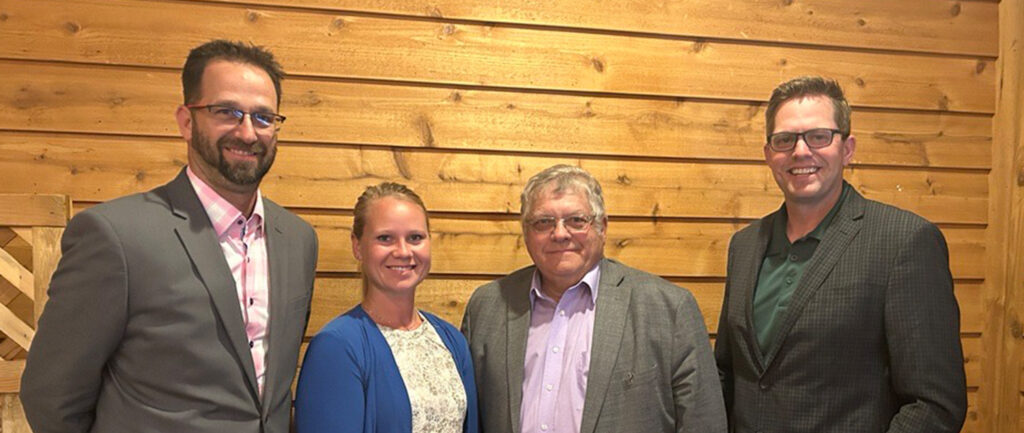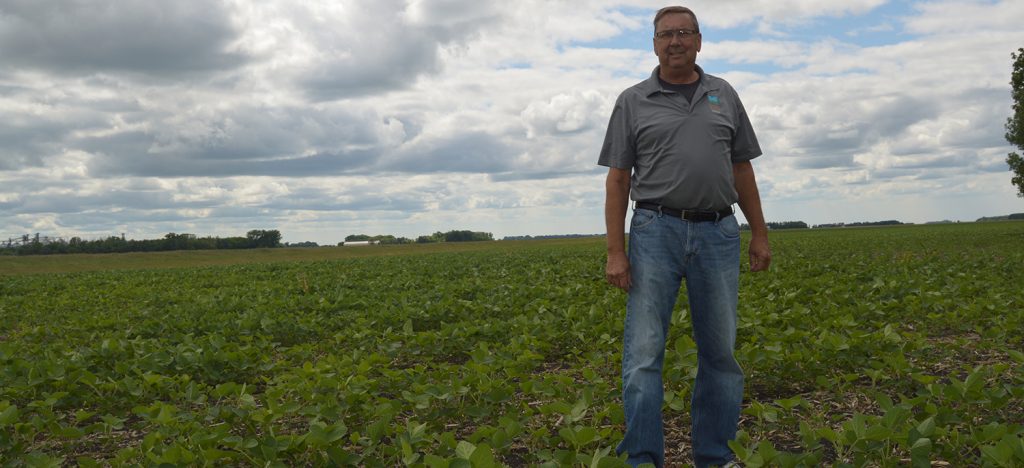This story was first featured in the September – October 2018 issue of Soybean Business. Click here to read the online version of the magazine.
First District: Dan Feehan (D) vs. Jim Hagedorn (R)
Republican Jim Hagedorn, a Blue Earth, Minn., native, came within a point of defeating incumbent Rep. Tim Walz in 2016. With Walz now running for governor, Hagedorn is running for the now-open First District seat for the fourth time. Republicans believe it’s a seat ripe for plucking from the Democrats.
“This seat is being closely watched at the national level,” says MSGA lobbyist Cory Bennett. “Both parties see the First District as a key to winning the House.”
Hagedorn’s opponent is Democratic newcomer Dan Feehan, an Iraq War veteran and former acting secretary of defense.

“I’m running for Congress to sustain agriculture and our rural way of life,” Hagedorn said. “This means three things: We have to keep the cost of farming low, we have to be able to sustain farmers when times are tough and we have to do everything possible to have global markets and exports for the agricultural products in all the world.”
Feehan, who grew up in Red Wing, Minn., declared himself fit to fight for farmers, and criticized the Trump administration’s trade policies.
“When I think of the blood, sweat and tears and the decades it took to open the markets that are open today, I think about how it was not just one person alone that did it,” Feehan said. “So it should not be one person alone who undoes that great work. I do not buy the idea that we, as Minnesotans, should take one for the team. That we should accept that this is the state of being and it should get better eventually. I do not accept that. Our Congress is a coequal branch of government who must be at the table when all matters of trade are discussed, and that is what I’m running on.”
Hagedorn supports trade agreements but says he’s remaining patient with the president’s trade stance.
“This is the temporary deal,” he said. “He (President Trump) is trying to work it out. China’s been dumping on us for 16 years. If you want to put farmers out of business, there’s more to it than just trade.”

Feehan, a former middle school teacher, wants to focus on the district’s prosperity and future as agriculture if elected.
“I want to keep our economy strong in southern Minnesota, and especially our agriculture economy,” he said. “Farmers are optimists. But what I worry about is that our Congress and our executive branch don’t share that optimism. They just aren’t working as hard as you to mitigate the daily risks you face in your life.”
Hagedorn is focused on the strength of the district.
“We want people to stay in our rural area,” he said. “But in order to do that, we have to make sure our agriculture economy is strong.”
Second District: Jason Lewis (R) vs Angie Craig (D)
In 2016, former talk show host Jason Lewis narrowly defeated health care executive Angie Craig by fewer than two percentage points to represent Minnesota’s Second District.

Two years later, Lewis’ seat is considered a toss-up. Craig has a significant fundraising advantage over the incumbent, who has been mired in controversy over comments he made during his career as a syndicated political commentator.
During a Farmfest panel, Craig declared her support for the Conservation Stewardship Program (CSP) and vaccine banks, which she calls an insurance policy for diseases. Craig also highlighted an eagerness to work with Congressional Republicans.
“We’ve got to get back to working together on a bipartisan basis, around all issues, particularly around ag,” said Craig, citing her displeasure with the House version of the farm bill. “We need markets and trades, not bailouts, and that’s what I’ll be fighting for as a member (of Congress).”

Lewis endorsed the House version at an agriculture panel at the Goodhue County Fair alongside MSGA Director Brad Hovel. Lewis came out in favor of the Market Facilitation Program, and is remaining patient with the Trump administration’s trade policy toward China.
“In fairness to the administration, and I think what they’re trying to say is, when we get out from under this we’ll have a better deal that addresses your concerns so that those low inputs can’t undercut our domestic production,” he said.
Seventh District: Collin Peterson (D) vs. Dave Hughes
Longtime Rep. Collin Peterson and opponent Dave Hughes are set for a rematch to represent Minnesota’s Seventh District. Peterson fended off Hughes by five percentage points in a closer-than-expected 2016 race.
The candidates sparred at Farmfest, explaining why they’re the best choice to serve western and northwestern Minnesota’s conservative-leaning district in Washington.
“I understand how critical ag is to western Minnesota,” said Hughes, a 21-year Air Force veteran. “I’m running to partner with President Trump to make our lives better, to accomplish his America first agenda. My opponent, Collin Peterson, has no interest in partnering with the president.”

A large portion of the discussion forum focused on the farm bill, as well as trade concerns. Peterson, who was named the most bipartisan member in the House in a Georgetown University study, bemoaned the lack of bipartisan cooperation in the House Agriculture Committee.
“Obviously, I don’t support the House position,” said Peterson, a ranking member of the House Ag Committee. “Mainly because we had 23 hearings on SNAP during the run up and not one single time did they us we should have work requirements beyond what we currently have. We have had work requirements since 1996. Have they worked? No, because we have waivers. Why are we trying to double down on something that doesn’t work?”
Hughes prefers the House version but also supports the hemp provision in the Senate bill.
“The (House) proposal is a very modest proposal,” he said. “Eighteen to 59 (years of age) is not extreme. That’s all the Republicans were proposing.”
The SNAP version of the House Farm Bill adds a work requirement for able-bodied adults, ages 18-59, to either hold a job for 20 hours a week or enroll in job training.
The conversation switched from the SNAP work requirement to another program that allows immigrants to work in the United States on a visa worker program,

“Congress should absolutely create legislation for the visa worker program,” said Hughes, a Karlstad, Minn., resident. “I think Congress should take a central role and strengthen a guest worker program because our farmers need it and our economy needs it.”
Peterson countered.
“I’m one of two Democrats that have signed onto the H-2C program,” he said. “We have introduced the bill but it didn’t get a vote before the recess. But we’re hopeful that we’ll build support and I’m working to get more Democrats. It sets up a mandatory E-Verify system. It does have a touch back that some are concerned about. But it’s been shortened up. … We’ve got this set up in a way that will work. It’s called the Ag and Legal Workforce Act.”
The H-2C program would replace the H-2A agricultural guest worker program, making both seasonal and year-round ag employers available to farmers and ranchers.





